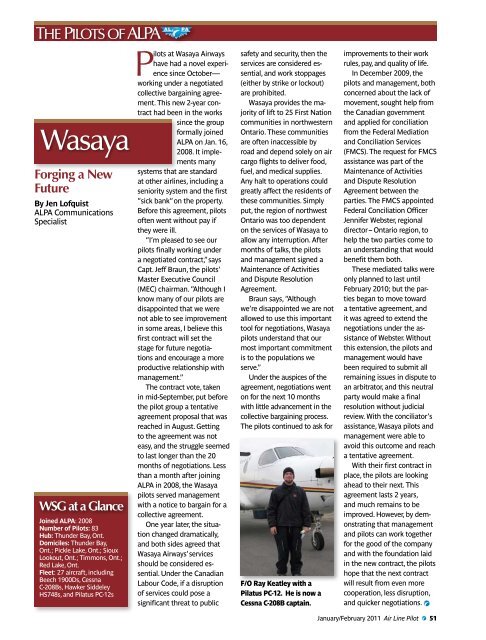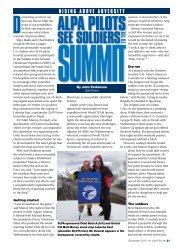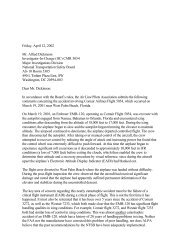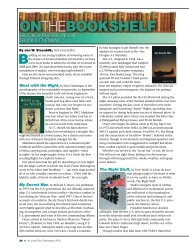The Pilots of ALPA - Air Line Pilots Association
The Pilots of ALPA - Air Line Pilots Association
The Pilots of ALPA - Air Line Pilots Association
Create successful ePaper yourself
Turn your PDF publications into a flip-book with our unique Google optimized e-Paper software.
THE PILOTS OF <strong>ALPA</strong><br />
Wasaya<br />
Forging a New<br />
Future<br />
By Jen L<strong>of</strong>quist<br />
<strong>ALPA</strong> Communications<br />
Specialist<br />
WSG at a Glance<br />
Joined <strong>ALPA</strong>: 2008<br />
Number <strong>of</strong> <strong>Pilots</strong>: 83<br />
Hub: Thunder Bay, Ont.<br />
Domiciles: Thunder Bay,<br />
Ont.; Pickle Lake, Ont.; Sioux<br />
Lookout, Ont.; Timmons, Ont.;<br />
Red Lake, Ont.<br />
Fleet: 27 aircraft, including<br />
Beech 1900Ds, Cessna<br />
C-208Bs, Hawker Siddeley<br />
HS748s, and Pilatus PC-12s<br />
<strong>Pilots</strong> at Wasaya <strong>Air</strong>ways<br />
have had a novel experience<br />
since October—<br />
working under a negotiated<br />
collective bargaining agreement.<br />
This new 2-year contract<br />
had been in the works<br />
since the group<br />
formally joined<br />
<strong>ALPA</strong> on Jan. 16,<br />
2008. It implements<br />
many<br />
systems that are standard<br />
at other airlines, including a<br />
seniority system and the first<br />
“sick bank” on the property.<br />
Before this agreement, pilots<br />
<strong>of</strong>ten went without pay if<br />
they were ill.<br />
“I’m pleased to see our<br />
pilots finally working under<br />
a negotiated contract,” says<br />
Capt. Jeff Braun, the pilots’<br />
Master Executive Council<br />
(MEC) chairman. “Although I<br />
know many <strong>of</strong> our pilots are<br />
disappointed that we were<br />
not able to see improvement<br />
in some areas, I believe this<br />
first contract will set the<br />
stage for future negotiations<br />
and encourage a more<br />
productive relationship with<br />
management.”<br />
<strong>The</strong> contract vote, taken<br />
in mid-September, put before<br />
the pilot group a tentative<br />
agreement proposal that was<br />
reached in August. Getting<br />
to the agreement was not<br />
easy, and the struggle seemed<br />
to last longer than the 20<br />
months <strong>of</strong> negotiations. Less<br />
than a month after joining<br />
<strong>ALPA</strong> in 2008, the Wasaya<br />
pilots served management<br />
with a notice to bargain for a<br />
collective agreement.<br />
One year later, the situation<br />
changed dramatically,<br />
and both sides agreed that<br />
Wasaya <strong>Air</strong>ways’ services<br />
should be considered essential.<br />
Under the Canadian<br />
Labour Code, if a disruption<br />
<strong>of</strong> services could pose a<br />
significant threat to public<br />
safety and security, then the<br />
services are considered essential,<br />
and work stoppages<br />
(either by strike or lockout)<br />
are prohibited.<br />
Wasaya provides the majority<br />
<strong>of</strong> lift to 25 First Nation<br />
communities in northwestern<br />
Ontario. <strong>The</strong>se communities<br />
are <strong>of</strong>ten inaccessible by<br />
road and depend solely on air<br />
cargo flights to deliver food,<br />
fuel, and medical supplies.<br />
Any halt to operations could<br />
greatly affect the residents <strong>of</strong><br />
these communities. Simply<br />
put, the region <strong>of</strong> northwest<br />
Ontario was too dependent<br />
on the services <strong>of</strong> Wasaya to<br />
allow any interruption. After<br />
months <strong>of</strong> talks, the pilots<br />
and management signed a<br />
Maintenance <strong>of</strong> Activities<br />
and Dispute Resolution<br />
Agreement.<br />
Braun says, “Although<br />
we’re disappointed we are not<br />
allowed to use this important<br />
tool for negotiations, Wasaya<br />
pilots understand that our<br />
most important commitment<br />
is to the populations we<br />
serve.”<br />
Under the auspices <strong>of</strong> the<br />
agreement, negotiations went<br />
on for the next 10 months<br />
with little advancement in the<br />
collective bargaining process.<br />
<strong>The</strong> pilots continued to ask for<br />
F/O Ray Keatley with a<br />
Pilatus PC-12. He is now a<br />
Cessna C-208B captain.<br />
improvements to their work<br />
rules, pay, and quality <strong>of</strong> life.<br />
In December 2009, the<br />
pilots and management, both<br />
concerned about the lack <strong>of</strong><br />
movement, sought help from<br />
the Canadian government<br />
and applied for conciliation<br />
from the Federal Mediation<br />
and Conciliation Services<br />
(FMCS). <strong>The</strong> request for FMCS<br />
assistance was part <strong>of</strong> the<br />
Maintenance <strong>of</strong> Activities<br />
and Dispute Resolution<br />
Agreement between the<br />
parties. <strong>The</strong> FMCS appointed<br />
Federal Conciliation Officer<br />
Jennifer Webster, regional<br />
director–Ontario region, to<br />
help the two parties come to<br />
an understanding that would<br />
benefit them both.<br />
<strong>The</strong>se mediated talks were<br />
only planned to last until<br />
February 2010; but the parties<br />
began to move toward<br />
a tentative agreement, and<br />
it was agreed to extend the<br />
negotiations under the assistance<br />
<strong>of</strong> Webster. Without<br />
this extension, the pilots and<br />
management would have<br />
been required to submit all<br />
remaining issues in dispute to<br />
an arbitrator, and this neutral<br />
party would make a final<br />
resolution without judicial<br />
review. With the conciliator’s<br />
assistance, Wasaya pilots and<br />
management were able to<br />
avoid this outcome and reach<br />
a tentative agreement.<br />
With their first contract in<br />
place, the pilots are looking<br />
ahead to their next. This<br />
agreement lasts 2 years,<br />
and much remains to be<br />
improved. However, by demonstrating<br />
that management<br />
and pilots can work together<br />
for the good <strong>of</strong> the company<br />
and with the foundation laid<br />
in the new contract, the pilots<br />
hope that the next contract<br />
will result from even more<br />
cooperation, less disruption,<br />
and quicker negotiations.<br />
January/February 2011 <strong>Air</strong> <strong>Line</strong> Pilot 51





